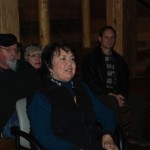
Article and photo By Jeannie Briones
TULALIP, Washington- Poetry is alive at the Tulalip Hibulb Cultural Center. Guest poet, Jamestown S’Kallam tribal member, Lulu Canales, is a student at the Northwest Indian College at the Tulalip site and on December 6th, she shared the most intimate moments of her struggles, pain, and joy, giving the audience a gritty look into her heart and soul.
Despite her small stature, Lulu stands tall in front of her audience, her words flowing with a fierce energy, piecing like jolts of electricity, sending out a tidal wave of emotions. The crowd responded, listening attentively to every word being spoken.
Only 20-years-old, she draws on past experience to provide her inspiration. She wrote her first poem at the tender age of seven, a poem about the loss of her mother, a woman she never knew. Poetry became a way for her to heal from the pain she felt throughout her lifetime.
“Poetry and music, that’s my life, poetry is the only way healthy way I know how to get the yuckiness out in a positive matter,” said LuLu. “If I am feeling angry about something and I feel like writing a poem, I will turn on real harsh hip hop beats, real fast, big base, really slamming and booming and it will come to me. One word turns into a phrase, a phrase turns into two lines, and into a stanza, and it will keep going and by the time I have come down, I’m sitting there with one to three sheets of paper. I try to let all my poetry have a beat,” said LuLu.
Lulu’s mother is Native American and her father is Hispanic. She never knew her mother and was raised most of her life by her father. As a young child, she had an appetite for words and read the dictionary for fun. Her need for knowledge and words fueled her curiosity and her natural ability to write raw emotions on paper.
At a young age, Lulu gained insight into her soul through poetry. She feels everything happens for a reason and that people good or bad have taught her valuable and tough lessons. She hales her late uncle, William Hunter, for changing her life. At thirteen, she recalls her uncle was the most sweet, loving, and charismatic man.
“With the exception of my father and my two little brothers, William David Hunter is one of the most important men in my life. He gave me the gift of being the women that I am today through learning my Native culture; he gave me back the other half of who I was.”
Another mentor to Lulu is her adoptive mother Renee Roman Nose. Both share a love for writing poetry. Renne inspired her to write and read her poetry, and through that support and encouragement she now shares her poetry and wants to help other through her poetic words.
“I am going to school for my certification in chemical dependency. Ultimately my goal is to be a social worker because I come from a hard background. I know there are kids out there like me who didn’t hear when they were younger that they have potential and that they have talent and what’s in their head and heart is important. I want to go out there and tell them, you are important and you do count, you are a person, and what’s inside is important. I want to take this poetry and writing and take it to people who need it and help them through my writing,” said LuLu.
For more information on future poetry series or other series at the Tulalip Hibulb Cultural Center & Natural History Preserves, please call 360-716-2600 or visit www.HibulbCulturalCenter.org
nes: 360-716-4188; jbriones@tulaliptribes-nsn.gov





